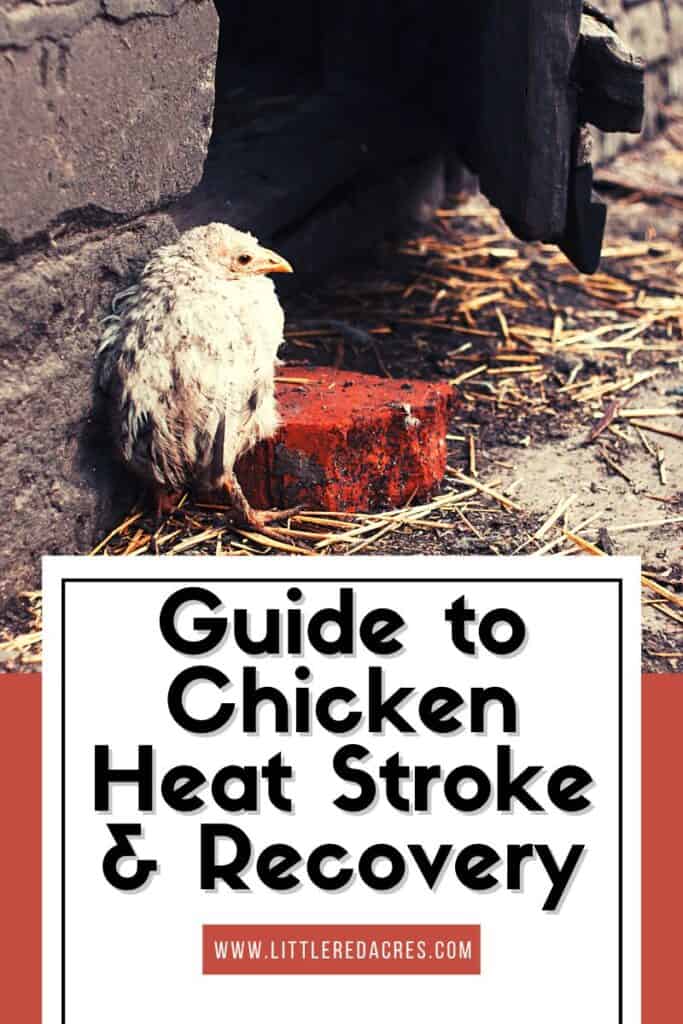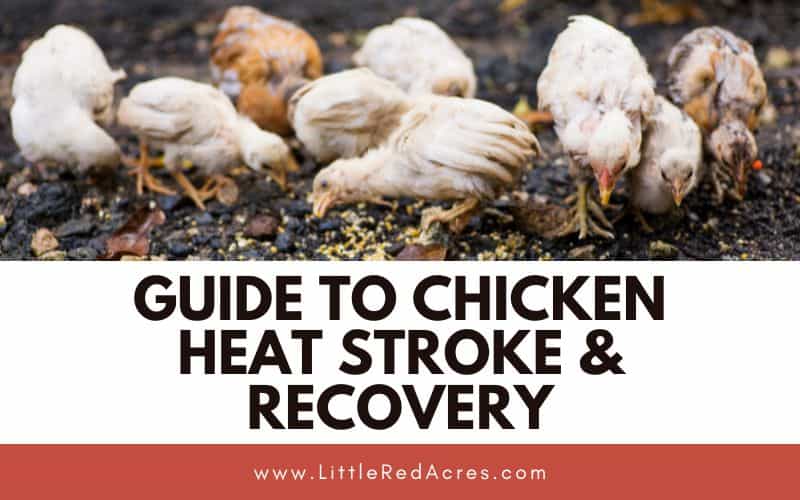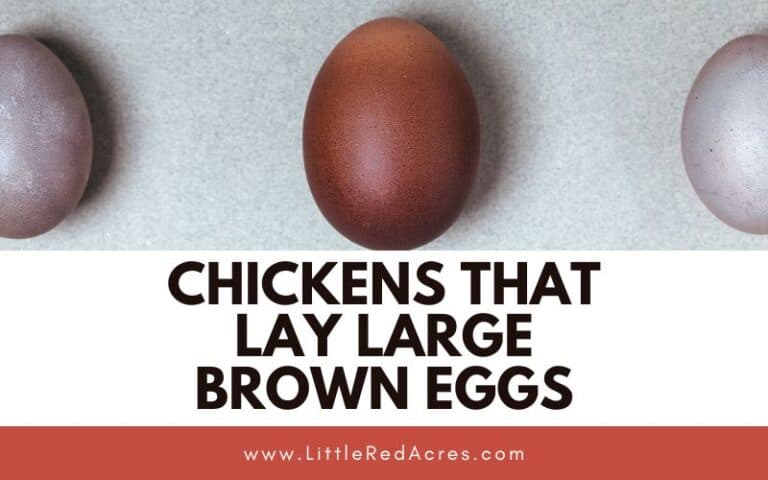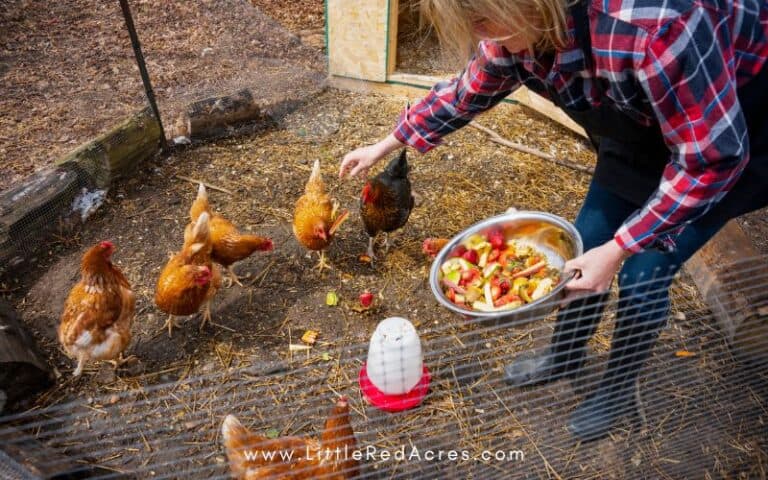Your Ultimate Guide to Chicken Heat Stroke & Recovery
Inside: Learn how to safeguard your flock from Chicken Heat Stroke with expert tips & discover effective recovery strategies in this comprehensive guide. Keep your chickens clucking contentedly!
As summer temperatures soar, chickens are at risk of heat stroke, a potentially life-threatening condition caused by prolonged exposure to extreme heat. Heat stroke can lead to dehydration, respiratory distress, and even death if not promptly addressed.

This post may contain affiliate links, see my disclosure policy for more information.
Your Ultimate Guide to Chicken Heat Stroke & Recovery
If you live in an area that gets extreme heat in the summer, you need to know the signs of heat stroke in chickens and home remedies to aid their recovery and prevent future occurrences.
Get updates & freebies delivered to your inbox!
Recognizing Heat Stroke in Chickens
Chickens are more susceptible to heat stress than many other domestic animals. Unlike people and other animals, chickens don’t have sweat glands, nor do their feathers allow for a refreshing breeze to cool the skin and decrease their body temperature.
Because of that, it’s important to stay vigilant about keeping your flock cool in the summer to prevent heat stress.
Understanding the signs of heat stroke can help you take swift action when necessary. Look out for these symptoms:
- Lethargy and Weakness: Heat-stressed chickens will appear sluggish and weak, spending more time sitting or lying down.
- Labored Breathing: Rapid, open-mouthed breathing is a clear sign of respiratory distress, indicating that the chicken is struggling to regulate its body temperature.
- Pale Comb and Wattles: The comb and wattles may lose their normal vibrant color, turning pale or even blueish in extreme cases.
- Wings Drooping: Chickens may hold their wings away from their bodies in an attempt to dissipate heat.
- Unresponsiveness: Severely affected chickens may become unresponsive and unable to stand or move.
First Aid Measures for Heat-Stroke Affected Chickens
If you suspect a chicken is suffering from heat stroke, immediate action is crucial to give them the best chance of recovery. Follow these first aid measures:
- Move to a Shaded and Cool Area: Relocate the chicken to a shady and well-ventilated spot away from direct sunlight. If you have a safe space inside a cool area of your home that would be best, then you can monitor it more closely.
- Offer Water: Provide access to cool, clean water, and encourage the chicken to drink. Adding electrolytes to the water can help rehydrate and replenish essential nutrients.
- Mist or Spray with Cool Water: Lightly mist or spray the chicken with cool water to assist in lowering its body temperature. Do not hit the chicken with a blast of freezing cold water! You are going to shock it, and possibly kill it. My chickens have enjoyed a cool mist over their run on extremely hot days.
- Fan or Ventilate: Use a fan or increase ventilation in the coop to improve air circulation and aid in cooling the birds.
- Limit Stress: Avoid handling or disturbing the chicken unnecessarily during recovery, as stress can exacerbate their condition.

Home Remedies for Heat Stroke Recovery
Supplement the first aid measures with these home remedies to support the chicken's recovery:
- Electrolyte Solution: Prepare an electrolyte solution with water, sugar, and salt, and administer it to the affected chicken to replenish lost nutrients and aid in rehydration.
- Frozen Treats: Offer frozen fruits or vegetables as a cooling treat to help reduce body temperature and keep the chickens hydrated.
- Watermelon: Watermelon is high in water content and can serve as a refreshing snack for chickens during hot weather.
- Shade and Dust Baths: Ensure ample shaded areas in the coop, and provide a dust bath with cool, dry dirt for chickens to cool off naturally.
- Soaked Feed: Wet the chicken's regular feed slightly to increase water intake and ease digestion during heat stress.
- Apple Cider Vinegar: Adding a tablespoon of raw, unfiltered apple cider vinegar to a gallon of water can aid in digestion and promote overall health during recovery.
- Electrolyte-Rich Foods: Offer electrolyte-rich foods like cucumber, spinach, or celery to boost hydration levels.

Preventing Future Heat Stroke
Prevention is key to ensuring your flock's well-being during hot weather. But I want to stress that sometimes there is nothing you can do. There are some areas that have experienced such extreme heat that despite all your best efforts you might lose chickens.
Not all chicken breeds can handle the heat. The chicken cools itself by circulating its blood throughout its comb and wattles. So if you have a breed of chicken like Brahmas, with smaller combs, they are not going to be able to handle the heat as well.
Some things you can do to help prevent heat stroke:
- Provide Ample Shade: Create shaded areas in the coop and outdoor runs to protect chickens from direct sunlight.
- Fresh Water: Ensure a constant supply of clean, cool water for your chickens to stay hydrated.
- Ventilation: Proper ventilation in the coop allows hot air to escape and keeps the area cool.
- Reduce Activity: Minimize handling and unnecessary activity during the hottest parts of the day to lower the risk of heat stress.
- Frozen Treats: Regularly offer frozen treats to chickens as a preventive measure during hot weather.
Heat stroke is a serious threat to the health of your flock, especially during scorching summer days. By recognizing the signs of heat stroke, taking preventative measures, and utilizing home remedies to aid recovery, you can give your chickens the best chance at bouncing back to health.
Prevention is equally important, so implement measures to keep your feathered friends cool and comfortable during the hot season. With care and attention, you can ensure your chickens thrive even in the hottest weather.
Frequently Asked Questions
How do I know if my chicken has heat stroke? She may have a pale wattles and comb, she may be lethargic, limp, or unconscious. A chicken exhibiting these symptoms is in extreme danger of dying from heat stress and needs to be cooled quickly.
At what temperature do chickens have a heat stroke? As temperatures rise above 100° F. chickens will begin to show signs of severe heat stress.

Want More?
How to Help A Sick Chicken
Natural Antibiotic for Chickens
Natural Antibiotic for Chickens






